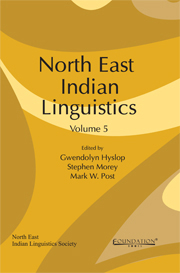Book contents
- Frontmatter
- Contents
- About the Contributors
- Foreword
- A Note from the Editors
- Contact and genetic linguistics
- 1 Koch dialects of Meghalaya and Assam: A sociolinguistic survey
- 2 The Siyom River Valley: An essay on intra-subgroup convergence in Tibeto-Burman
- 3 On the internal phylogeny of East Bodish
- Historical-comparative Tibeto-Burman grammar
- The North East Indian noun phrase
- Assamese grammar
- Advances in Boro-Garo phonology
- Poetics and text
1 - Koch dialects of Meghalaya and Assam: A sociolinguistic survey
from Contact and genetic linguistics
Published online by Cambridge University Press: 05 September 2013
- Frontmatter
- Contents
- About the Contributors
- Foreword
- A Note from the Editors
- Contact and genetic linguistics
- 1 Koch dialects of Meghalaya and Assam: A sociolinguistic survey
- 2 The Siyom River Valley: An essay on intra-subgroup convergence in Tibeto-Burman
- 3 On the internal phylogeny of East Bodish
- Historical-comparative Tibeto-Burman grammar
- The North East Indian noun phrase
- Assamese grammar
- Advances in Boro-Garo phonology
- Poetics and text
Summary
Introduction
Purpose and Goals
Language surveys are conducted around the world for a variety of reasons: initial description of so far undocumented languages, assessing the vitality of endangered languages, evaluating differences and similarities of related speech forms, studying people's attitudes about different languages, measuring multilingualism, initiating a language development program etc. The purpose of this sociolinguistic survey was to determine the need for language development in the Koch community of North East India. In order to meet this purpose, several specific goals were set:
To clarify the relationship between Koch and Rabha, and to find out the degree of comprehension between them (see section 3, ‘Dialects of the language’).
To investigate the patterns of language use in the Koch community as well as attitudes towards their own language and towards other languages spoken in the region; to assess the vitality of the Koch language (see section 4, ‘Language use, attitudes and vitality’).
To find out if there are any language development efforts going on in Koch and to determine what variety (if any) is considered to be the best/most suitable for development (see section 4, ‘Language use, attitudes and vitality’). The Koch dialects remain largely undocumented and very much lack written materials; whereas some of the dialects are already endangered.
To assess Koch speakers' abilities in a second language (see section 5, ‘Bilingualism’).
- Type
- Chapter
- Information
- North East Indian Linguistics , pp. 3 - 59Publisher: Foundation BooksPrint publication year: 2013



